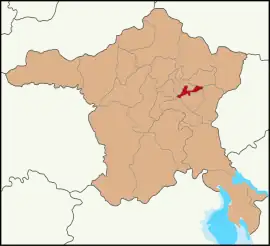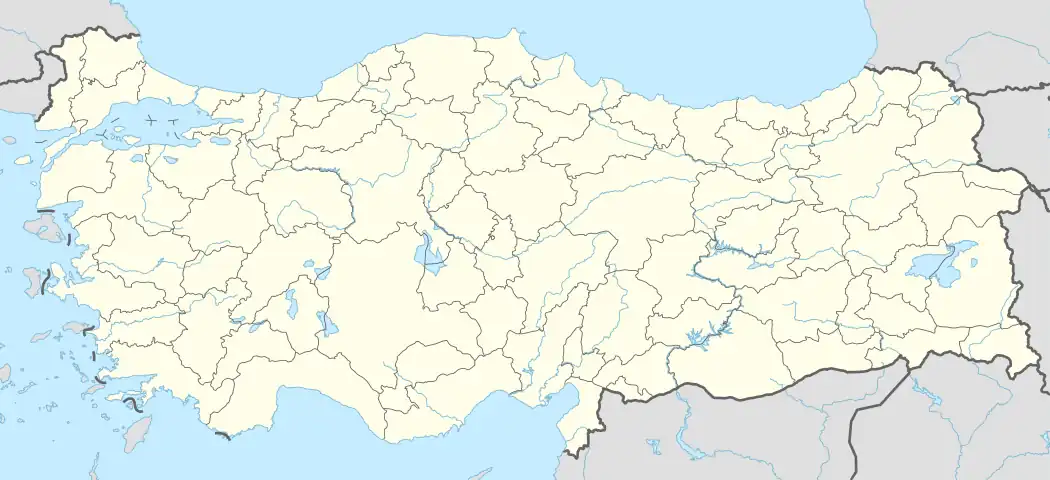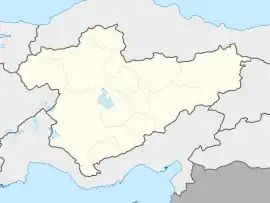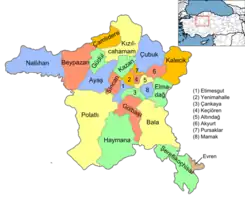Altındağ | |
|---|---|
District and municipality | |
.jpg.webp) | |
 Map showing Altındağ District in Ankara Province | |
 Altındağ Location in Turkey  Altındağ Altındağ (Turkey Central Anatolia) | |
| Coordinates: 39°57′49″N 32°54′12″E / 39.96361°N 32.90333°E | |
| Country | Turkey |
| Province | Ankara |
| Government | |
| • Mayor | Asım Balcı (AKP) |
| Area | 123 km2 (47 sq mi) |
| Elevation | 900 m (3,000 ft) |
| Population (2022)[1] | 413,994 |
| • Density | 3,400/km2 (8,700/sq mi) |
| Time zone | TRT (UTC+3) |
| Area code | 0312 |
| Website | www |
Altındağ is a municipality and district of Ankara Province, Turkey.[2] Its area is 123 km2,[3] and its population is 413,994 (2022).[1] It covers the northeastern part of the city of Ankara. Its elevation is 900 m (2,953 ft).
Demographics
| Year | Pop. | ±% p.a. |
|---|---|---|
| 2007 | 370,735 | — |
| 2012 | 363,744 | −0.38% |
| 2017 | 371,366 | +0.42% |
| 2022 | 413,994 | +2.20% |
| Source: TÜIK (2007-2022)[1] | ||
Neighbourhoods
There are 26 neighbourhoods in Altındağ District:[5]
- Atıfbey
- Aydıncık
- Aydınlıkevler
- Baraj
- Başpınar
- Battalgazi
- Beşikkaya
- Doğantepe
- Feridun Çelik
- Gicik
- Gültepe
- Güneşevler
- Hacettepe
- Hacı Bayram
- Kale
- Karacaören
- Karapürçek
- Kavaklı
- Önder
- Örnek
- Peçenek
- Solfasol
- Tatlar
- Ulubey
- Yıldıztepe
- Zübeyde Hanım
Geography
Located just outside the city centre, (beyond the district of Ulus as far as the large Altınpark), this hillside has long been home to the workers in the city of Ankara but Altındağ remains one of the poorer quarters of the capital. The hillside is covered with illegally built gecekondu housing, home to low-income families. Among the housing there are some municipal buildings, public housing, state housing for civil servants and many car-repair workshops.
The ancient Ankara Castle is in Altındağ and there has recently been investment in restoration work. With this architectural heritage, Altındağ is a member of the Norwich-based European Association of Historic Towns and Regions.[6]
History
Altındağ includes parts of the historic city of Ankara, as well as the first National Assembly in which Republic of Turkey was founded is in Ulus.
Altındağ was the location of one of the first gecekondu developments in Turkey, when in the 1950s and 1960s people illegally built small, one-bedroom houses on small plots of land; then in the 1970s and 1980s these plots of land were made legal through amnesty legislation, and eventually sold to developers who replaced these shacks with larger, multi-story apartment buildings.
Prominent neighbourhoods
- Aydınlıkevler - a quiet residential neighbourhood of civil servants and other members of Ankara's middle class; centred on an avenue of schools, banks and shops; contains the SSK teaching hospital, a military officers housing compound, the headquarters of Türk Telekom, Ankara University's faculty of agriculture and Altınpark.
- Hacı Bayram - home to one of the oldest mosques in Ankara, the mosque and tomb of the 14th-century Ankara-born mystic Haci Bayram Veli, famous for prophesying the conquest of Constantinople, and then founding his own Sufi sect. The district has recently been renovated by urban planner Raci Bademli.
Places of interest

- Altınpark - A large park, formerly a golf course, noted for its 10-metre-high (33 ft) statue of a loaf of bread at the entrance; contains a fairground, go-karting, ice-skating, large pools for boating and fishing, the Feza Gürsey Science Center, and much more.
- Çamlık - view of the city from the hill
- Ankara Castle (kale) - the hilltop heart of the old city of Ankara, built by the Galatians and the Byzantines, now surrounded with antique shops, coffee houses and bar/restaurants in restored Ottoman-period wooden houses, where traditional Turkish music (fasıl) is played late into the evening. One of Ankara's few historical sites.
- Karapürçek - location of Ankara's annual oil-wrestling tournament.
- Ulucanlar Prison Museum
References
- 1 2 3 "Population Of SRE-1, SRE-2, Provinces and Districts". TÜIK. Retrieved 20 June 2023.
- ↑ Büyükşehir İlçe Belediyesi, Turkey Civil Administration Departments Inventory. Retrieved 8 June 2023.
- ↑ "İl ve İlçe Yüz ölçümleri". General Directorate of Mapping. Retrieved 22 May 2023.
- ↑ Turkish Statistical Institute
- ↑ Mahalle, Turkey Civil Administration Departments Inventory. Retrieved 22 May 2023.
- ↑ European Association of Historic Towns and Regions. "Historic Towns of Turkey". Archived from the original (DOC) on 2008-09-10. Retrieved 2008-03-28.
External links
- Altındağ Haberleri (in Turkish)
- District governor's official website (in Turkish)
- District municipality's official website (in Turkish and English)
- Kenthaber Uluslararası İnternet Med.Yay.Ltd.Şti. "General information on Altındağ district of Ankara" (in Turkish). Archived from the original on 2011-07-19.
